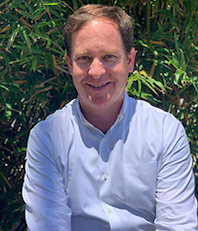Casey Sandack: Balancing Budgetary Priorities in a New Era of Value-Based Care
 Jonathan “Casey” Sandack took on his role as Administrative Vice Chair of the UC San Diego Department of Surgery earlier this year after serving as Chief Financial Officer at the UC San Diego Moores Cancer Center. Sandack graduated from UC San Diego in 1994 with a degree in Management Science and then went on to get an MBA in Finance from San Diego State University. Together with the executive leadership of the Department of Surgery, Sandack develops and oversees the department’s $75 million budget, among other responsibilities. Now that budget season is over, we took the opportunity to interview Sandack about his role in the department, his approach to overseeing “the business side” of surgery and the challenges he faces in the new era of value-based care.
Jonathan “Casey” Sandack took on his role as Administrative Vice Chair of the UC San Diego Department of Surgery earlier this year after serving as Chief Financial Officer at the UC San Diego Moores Cancer Center. Sandack graduated from UC San Diego in 1994 with a degree in Management Science and then went on to get an MBA in Finance from San Diego State University. Together with the executive leadership of the Department of Surgery, Sandack develops and oversees the department’s $75 million budget, among other responsibilities. Now that budget season is over, we took the opportunity to interview Sandack about his role in the department, his approach to overseeing “the business side” of surgery and the challenges he faces in the new era of value-based care.
July 29, 2019 | Interview by Tiffany Fox
Q: What are your chief responsibilities as Administrative Vice Chair?
A: My chief responsibilities are overseeing the department’s financial picture and overseeing the business operations of the department, including academic personnel (recruitment) and human resources. I lead the budget process, which involves the UC San Diego Health Sciences, the Physician Group and the UC San Diego Health system resources. Additionally, I serve as the service line administrator for Surgery and partner with the Physician Group and Health System on many things clinical (strategic planning, revenue cycle issues, and program enhancements).
Q: What is it like to build a budget that juggles the priorities of those three different entities?
A: It makes for a complex budget process. What is surprising is that -- at half a year -- it’s such a long process. It starts in January and doesn’t wrap until June. The process is long because it requires coordination between those three major entities. Because we are a heavily clinically oriented department, the primary source of our funding is physician professional revenues known as C.A.R.E. payments -- essentially insurance reimbursements that are funneled through the Physician Group. Also part of our budget is research funding handled through the School of Medicine, as well as funding from state funds that support our faculty. The UC San Diego Health system support comes in the fund of strategic support and purchased services from our physicians, such as medical directorship roles.
Q: Is the budget process for the Department of Surgery much different from budgets you previously oversaw?
A: I previously held jobs on campus where I was dealing with one basic operating budget. When I first started work at UC San Diego, I was in capital planning and was focused on major capital improvements, and the budget process was a much smaller part of my time.
Q: Now that the budget process is over for this year, how will your priorities shift?
A: It’s important during non-budget times to think about how we can strategically set ourselves up to meet unmet needs for the future. It’s hard to plan for new programs and negotiate for those resources at the same time. We need programs to be developed and defined so we can have the right conversations during the budget process. Like for many academic medical centers, resources are becoming more and more constrained with the value-based reimbursement environment we’re heading into. Our insurance networks are getting narrower and the payments are getting tighter as we move closer to value-based care. When we negotiate our contracts, we’ll be under more pressure to show better outcomes, shorter lengths of stay and other metrics in order to negotiate the favorable rates we’re used to as a high-quality medical care provider. Think of it as downward pressure on reimbursement rates. With thinner margins, there’s less clinical net income to help support our other missions - teaching and research.
Q: Why did you choose this profession?
A: I’ve always enjoyed the business of academic medicine, having been interested in being a doctor at one point in my life but then realizing I had better business skills than scientific skills. In my career, I’ve enjoyed supporting and partnering with physicians and scientific leaders to get programs built. That’s what’s fun for me, and it’s been a pleasant experience so far doing that for the Department of Surgery. I’ve appreciated the culture here and the collaboration. I want to continue to support the department in whatever it needs.
